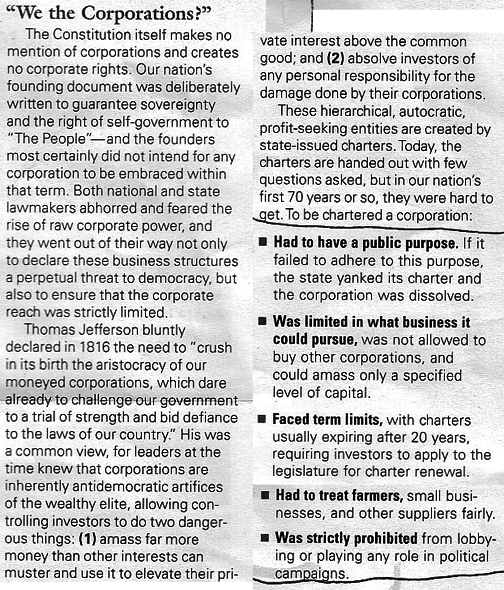This is some scary stuff;
The question at the heart of one of the biggest Supreme Court cases this year is simple: What constitutional rights should corporations have? To us, as well as many legal scholars, former justices and, indeed, drafters of the Constitution, the answer is that their rights should be quite limited — far less than those of people.
his Supreme Court, the John Roberts court, seems to be having trouble with that. It has been on a campaign to increase corporations’ legal rights — based on the conviction of some conservative justices that businesses are, at least legally, not much different than people.
Now the court is considering what should be a fairly narrow campaign finance case, involving whether Citizens United, a nonprofit corporation, had the right to air a slashing movie about Hillary Rodham Clinton during the Democratic primary season. There is a real danger that the case will expand corporations’ rights in ways that would undermine the election system.
The legal doctrine underlying this debate is known as “corporate personhood.â€
The courts have long treated corporations as persons in limited ways for some legal purposes. They may own property and have limited rights to free speech. They can sue and be sued. They have the right to enter into contracts and advertise their products. But corporations cannot and should not be allowed to vote, run for office or bear arms. Since 1907, Congress has banned them from contributing to federal political campaigns — a ban the Supreme Court has repeatedly upheld.
In an exchange this month with Chief Justice Roberts, the solicitor general, Elena Kagan, argued against expanding that narrowly defined personhood. “Few of us are only our economic interests,†she said. “We have beliefs. We have convictions.†Corporations, “engage the political process in an entirely different way, and this is what makes them so much more damaging,†she said.
Chief Justice Roberts disagreed: “A large corporation, just like an individual, has many diverse interests.†Justice Antonin Scalia said most corporations are “indistinguishable from the individual who owns them.â€
And according to The Hightower Lowdown (Vol. 11 No. 9 • Sept 2009)

None of this should come as a surprise if you look at Roberts’ resume before he became a justice. He was a Washington lawyer making millions defending corporations. It seems the Bush mess continues.
I like the original rules – at least for the bigger corporations.
LLC’s, smaller C-corps, S-corps, PCs and the like shouldn’t be counted in the ranks of eeeeeevil corporations.
Monsanto, on the other hand, is an evil corporation.
Corporations, big or small, shouldn’t be counted as ‘persons’ period. and as far as I am concerned, ‘speech’ and ‘money’ are two different things. One more reason why campaigns should be publicly funded.